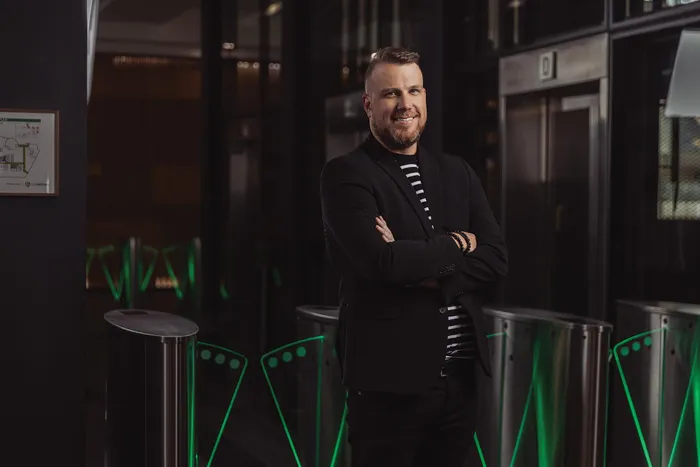Building Africa’s startup ecosystem requires grit, trust and corporate courage

Tramayne Monaghan, Chief Ventures Officer at NEXT176.
Image: Supplied
The stories of startups in Silicon Valley often start in garages with founders backed by easy access to capital and forgiving safety nets. In Africa, the reality is very different. Entrepreneurs on the continent aren’t innovating from the top of Maslow’s hierarchy, but at the base, solving urgent, everyday challenges where failure can mean families go hungry. That makes African founders some of the most resilient in the world, but the capital environment rarely matches their ingenuity.
Over the past year, African startups have maintained growth and adaptability despite a global downturn in venture capital and economic challenges. According to the International Finance Corporation (IFC), African tech startups are still growing and adapting even with a 52% drop in capital between 2022 and 2024. Importantly, there were only 22 exits in 2024 compared with 20 in 2023 which reflects a growing market maturity. Founders are thriving despite a challenging ecosystem of limited funding and complex operating conditions and their success comes down to two things – grit and tenacity.
Startups that persist despite facing a market that has fewer opportunities, unfavourable market conditions and scarcity of funding stay focused on their vision and are determined to succeed with or without support.
And yet, support is critical. Increased funding and active investment are vital to ensuring startups remain innovative and geographically diverse. The IFC has found that when startups have access to venture capital and wider financial support, they can digitise informal businesses, expand their services and increase their competitiveness, especially for microbusinesses. As venture capital remains shallow across the continent and external investors are cautious, this is where corporate balance sheets and capabilities can change the narrative.
Corporate venturing isn’t new globally, but in Africa it is still emerging. Strong brands with profitability, teams and customer access have a responsibility to use those strengths to bolster the ecosystem and support startups that are already proving their merit with constrained funding. Its value lies in extending the time horizons for innovation. While traditional corporates measure results on a one to three year cycle, venture builders such as NEXT176 look five to ten years into the future. This creates breathing room for startups to develop ideas into scale as they gain access to funding, expertise, talent and distribution networks while corporates benefit from being challenged and exposed to fresh ideas – they are reminded of their own startup origins.
Corporate-backed innovation also changes the trajectory of exits. Recent acquisitions show how established players can accelerate their own growth by purchasing startups while simultaneously reinforcing a founder’s confidence to build again. Each successful exit seeds the next cycle of entrepreneurial energy. That said, corporate-startup partnerships remain fraught with tension. Startups want to move fast, while corporates are methodical and risk-averse which means that misalignment can drain both sides. Mutual success depends on corporates being willing to experiment without bureaucracy, and startups being patient enough to navigate hierarchies and compliance checks. It is worth the wait and the paperwork because, when partnerships succeed, they create enormous value, scaling innovations across established customer bases while reimagining corporate thinking in return.
However, capital is not the only success factor. Regulatory frameworks are key to protecting and constraining innovation. South Africa’s robust financial system attracts fintech funding by safeguarding shareholder money, yet rigid corporate tax structures and slow adaptation often deter investors who could achieve better returns in markets with more flexible regimes. This is a double-edged sword that asks for balance – entrepreneurs who understand regulation can use it to their own advantage, but they need to ensure their frameworks remain up to date and relevant, because outdated compliance systems risk stifling growth.
Another key ingredient is to remember the value of localisation. Global playbooks for blitz scaling and app-first strategies often miss the realities of African markets, where USSD channels, WhatsApp penetration and limited device storage channel and change the shape of consumer engagement. Innovation in Africa means rethinking scale through community-driven solutions and alternative channels rather than replicating Western models and recognising how tools are used in the local context.
Artificial intelligence is also lowering barriers to entry at unprecedented speed. Today, someone with no coding skills can launch an app, website or e-commerce business in a weekend using AI tools and this accessibility has the potential to drive a new type of startup. From high-risk visionaries to entrepreneurs experimenting alongside their day jobs, the opportunity cost of building is collapsing, and over the next few years the ecosystem will see more founders creating more ventures at lower risk and cost. The era of the one-person unicorn has arrived thanks to AI, and the implications are profound. Africa could witness the first billion-rand business built by a single person within the next five years and as technology equalises opportunity, the question becomes whether access will be inclusive or concentrated which is a challenge for policymakers, corporates, and communities alike.
Building scalable startups in Africa requires tapping into a unique mix of resilience, localisation, and community trust NEXT176 positions itself at the intersection of startup speed and corporate scale. By backing ventures in underserved ecosystems such as blue-collar employment, it creates opportunities aligned with Old Mutual’s legacy strengths while testing new models of growth. The aim is to build, to provide capital, expertise and corporate access that will help founders endure the toughest parts of the journey.
Old Mutual’s support ensures that innovation is not confined to isolated startups but embedded in systems capable of shifting economies, and together, they illustrate how corporate-backed innovation, when done with intention and courage, can transform Africa’s tech ecosystem from resilient survival to scalable success.
Tramayne Monaghan, Chief Ventures Officer at NEXT176.
*** The views expressed here do not necessarily represent those of Independent Media or IOL.
BUSINESS REPORT